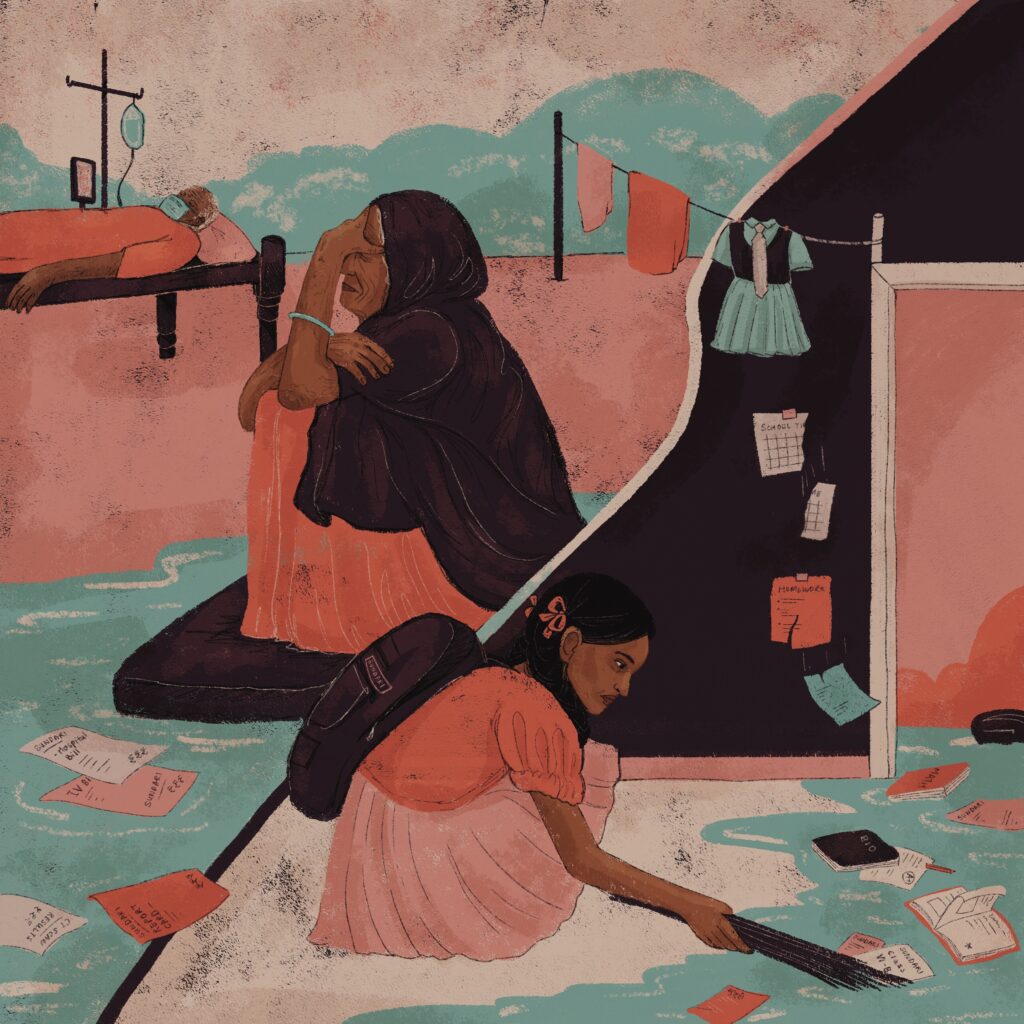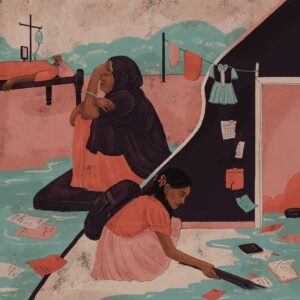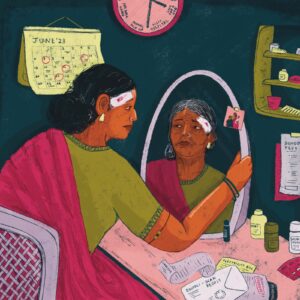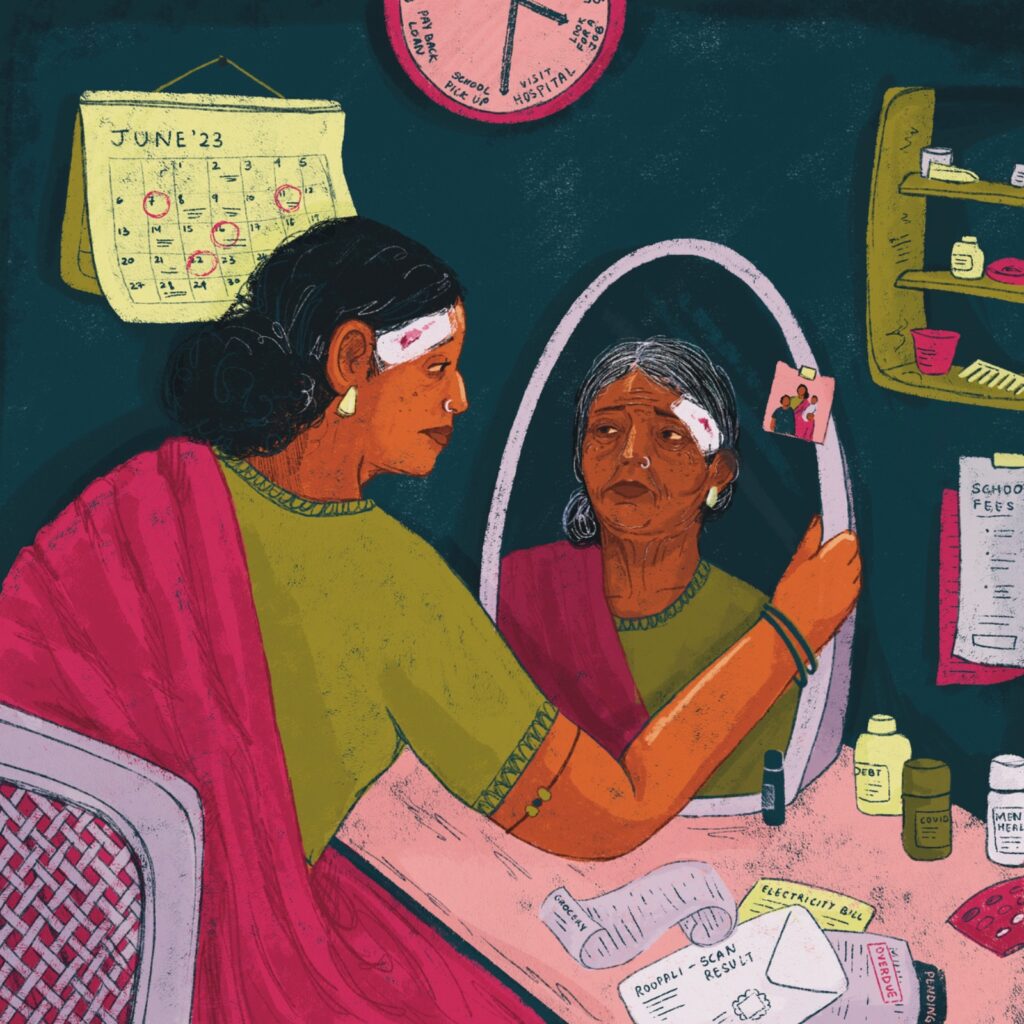भारत का वेतनभोगी घरेलू कामगार कार्यक्षेत्र मौजूदा समय में उतार-चड़ाव के दौर से गुजर रहा है, जिससे घरेलू कामगारों के अधिकारों पर दुष्प्रभाव पड़ रहा है। आर्थिक अनिश्चितता, काम और आमदनी का संकट हमेशा से घरेलू कामगारों के जीवन की कड़वी सच्चाई रही है। लेकिन कोविड-19 महामारी और लॉकडाउन की शुरुआत के तीन साल बाद, इसके विनाशकारी प्रभाव घरेलू कामगारों के अधिकारों के विरुद्ध स्पष्ट प्रतिक्रिया के रूप में दिखाई दे रहे है। अनिश्चित परिस्थितियों में रहने को मजबूर महिला घरेलू कामगार महामारी व लॉकडाउन के दुष्प्रभावों का ख़ामियाज़ा आज भी भुगत रही है।
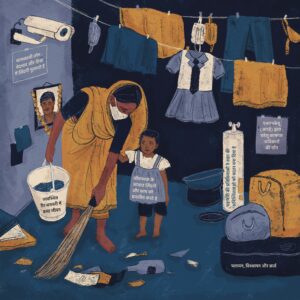
Illustration by Mrinalini Godara.
भारत में घरेलू कामगारों के विरुद्ध प्रतिक्रिया की प्रासंगिकता
इस प्रतिक्रिया की तीव्रता और तीक्ष्णता का एक कारण भारत में घरेलू कामगारों के भुगतान में की गयी व्यवस्थागत असमानताएँ हैं। हालाँकि यह शहरी महिला कामगारों के लिए सबसे बड़े क्षेत्रों में से एक है, लेकिन भुगतान के संदर्भ में घरेलू काम को व्यवस्थित रूप से राज्य, समाज और मालिकों द्वारा नज़रअंदाज़ कर इसे कम महत्व दिया गया है। इसके पीछे की जड़ें काफ़ी गहरी हैं, जिसमें घरेलू काम को लेकर पितृसत्तात्मक जेंडर आधारित दृष्टिकोण है, जो महिलाओं के लिए बतायी गयी उनकी प्राकृतिक भूमिका (घरेलू काम) का महज़ विस्तार और इसका पारिवारिक जगहों पर प्रदर्शन है। साथ ही, घरेलू काम मुख्य रूप से हाशिएबद्ध समुदाय की महिलाओं द्वारा किया जाता है। दलित, आदिवासी और प्राथमिक शिक्षा से पूरी तरह दूर महिलाएँ वृहत स्तर पर इस प्रवासी कार्यबल को बनाती है।
यही वजह है कि अनौपचारिकता और अनिश्चितता घरेलू काम की विशेषता होती है, जिसमें घरेलू कामगारों को जेंडर, जाति, धर्म व प्रवास के आधार पर भेदभाव और बुरे हालातों में काम करने को मजबूर होना पड़ता है। शहरों में सार्वजनिक सेवाओं व संसाधनों तक की पहुँच से दूर अनिश्चितताओं के साथ हाशिए पर बसने को घरेलू कामगार मजबूर है।
अपनी प्रतिक्रियाओं की कहानी बताते घरेलू कामगार
दिल्ली और नेशनल कैपिटल रीजन (एनसीआर) के घरेलू कामगारों की जिंदगियों की झलक पर केंद्रित आगामी स्टोरीबुक ‘जेंडर एट वर्क कंसल्टिंग – इंडिया’ द्वारा तैयार की गयी है। इसका लोकार्पण अगस्त 2023 में किया जाएगा। इस किताब में दलित, आदिवासी, मुस्लिम समुदाय और अन्य समुदाय से घरेलू काम के साथ और इसके बाहर जीने वाले युवा-वृद्ध, लंबे समय से इस काम में लगे हुए और नए प्रवासी के अनुभव शामिल है। ये स्टोरीबुक उन जाति, धर्म और जेंडर आधारित हिंसा और इससे जुड़ी प्रतिक्रियाओं को सामने लाती है, जिसने महामारी के दौरान विकराल रूप ले लिया है।
ये स्टोरीबुक घरेलू कामगारों की प्रतिक्रियाओं के अनुभवों को दर्शाती है और अपने अधिकारों के चिंताजनक दमन और जारी संघर्ष को बयाँ करती है। इस पिछड़ेपन से जारी संघर्ष का अंदाज़ा एक घरेलू कामगार के वक्तव्य से लगाया जा सकता है जब वो कहती है कि, ‘हम दस–बीस साल पीछे चले गए ।‘
यह एक ऐसा क्षेत्र है, जिसमें काम करने वाले लोगों को उनके अधिकारों के संदर्भ में कोई फ़ायदा नहीं हुआ है। घरेलू कामगारों के लगातार जारी संघर्ष व आवाज़ उठाने के बावजूद देशभर में श्रमिक के रूप में घरेलू कामगारों के अधिकारों को व्यवस्थित रूप से मान्यता नहीं है। कुछ अपवाद हैं, जहां उनके अधिकारों को मान्यता दी गयी है (जैसे कि कुछ भारतीय राज्यों में न्यूनतम वेतन अधिसूचना में घरेलू कामगारों को शामिल करना, कुछ राज्यों में कल्याण के लिए श्रमिकों के रूप में उन्हें शामिल करना या कार्यस्थल पर यौन-उत्पीड़न के रूप में घरों को शामिल करना) जो काग़ज़ी तो है लेकिन उनके लाभ का असर बेहद सीमित है।
सालों पीछे जाने की इस भावना के रूप ने कई रूप ले लिए हैं, जिन्हें महामारी और लंबे समय तक लॉकडाउन के संदर्भ में स्टोरीबुक में संकलित कहानियों में उजागर किया गया है। ये कहानियाँ उजागर करती है –
- आजीविका का व्यापक स्तर पर विनाशकारी नुक़सान
- उनलोगों के काम में दबाव जो काम पर बने रहे या फिर वापस लौट आए
- वेतन की कमी
- भेदभाव का बढ़ता स्तर व आर्थिक असुरक्षा से क़र्ज़ का उच्च स्तर
- भोजन और आवास की असुरक्षा
- शारीरिक और मानसिक स्वास्थ्य बिगड़ना
इन चिंताजनक नुक़सान के मद्देनज़र, घरेलू कामगारों को अपने मालिक व राज्य से अपमान और तिरस्कार का सामना करना पड़ता है। उन्हें शक्तिहीन बनाकर चुप करवा दिया गया है। उन्हें और घरेलू कामगार संगठन जैसे ‘शहरी महिला कामगार यूनियन’ को सामूहिक तौर पर वेतन को लेकर मोलभाव करने और सत्ता को चुनौती देने के आधारों को उलट दिया गया है, जिससे वे सालों पीछे चले गए है। महामारी ने घरेलू कामगारों के विरुद्ध की प्रतिक्रियाओं को ‘प्रकटीकरण का क्षण’ बना दिया है।
हम इसे रूपाली और सुंदरी की कहानी के रूप में देख सकते हैं, जहां उनका जीवन असुरक्षाओं, पारिवारिक बीमारियों और भेदभाव के कड़वे अनुभवों से घिरा हुआ है।
घरेलू कामगारों के विरुद्ध व्यवस्थागत भेदभाव, हाशिएबद्ध पर बसने को मजबूर और उनकी जिंदगियों में हुए ‘ढ़ेरों नुक़सान के अनुभव‘ को ये स्टोरीबुक सामने लाती है। घरेलू कामगारों की क़रीब सभी कहानियाँ उनकी जिंदगियों की असुरक्षा, संघर्ष और कठिनाइयों को उजागर करती है। ये कहानियाँ बाल विवाह, अशिक्षा और पारिवारिक आर्थिक संकट की वजह से उनके काम करने के संघर्ष को उजागर करती है।
प्रतिक्रियाओं का चश्मा
महामारी के दौरान व्यवस्थागत अन्याय और हिंसा का अनुभव बढ़ा, जिसकी जड़ें जाति और धर्म पर आधारित ‘पवित्रता’ के विचार, प्रदूषण और छुआछूत थी। शादी, तलाक, बीमारी, बच्चे का जन्म, किसी प्रियज़न की मृत्यु या प्रवास जैसी रोज़मर्रा की आम घटनाएँ भी घरेलू कामगारों के लिए एक सदमे के रूप में सामने आयी, जैसे कि अधिक व्यवस्थागत सदमे के तौर पर ज़बरन विस्थापन, जलवायु परिवर्तन और महामारी को उन्होंने लगातार अपने जीवन पर होने वाली ‘प्रतिक्रियाओं के वीभत्स अनुभवों के रूप‘ में जिया है।
अब एसएमकेयू जैसे घरेलू कामगार संगठनों को भारी चुनौतियों का सामना करना पड़ रहा है, जिसमें वे घरेलू कामगारों के मोलभाव की क्षमता के साथ-साथ इस क्षेत्र में बदलाव के संदर्भ में घरेलू कामगारों द्वारा सामना किए जाने वाले विरोध का सामना कर रहे हैं, जिसमें मालिक अब ‘पूर्णकालिक’ कामगारों की माँग कर रहे हैं। इसके बीच ये स्टोरीबुक एसएमकेयू जैसे संगठनों द्वारा महामारी के दौर में राशन की मदद, घरेलू श्रमिकों को ऑनलाइन योजनों के लाभ तक पहुँचाने में सक्षम बनाने जैसे ज़रूरी राहत प्रयासों को भी उज़गार करती है जो घरेलू कामगारों के लिए अमूल्य और इस मुश्किल दौर में उन्हें कुछ राहत दिलाने में मददगार साबित हुई। साथ ही, संगठन ने एक ऐसी जगह तैयार की जहां वे संगठित होकर अपने अधिकारों व संघर्षों के मुद्दे पर एकजुट हो सकें। संगठन के प्रयासों से घरेलू कामगारों के लिए एकजुटता और समर्थन की एक ज़रूरी जीवनरेखा तैयार हुई है, जिससे अब वे सामूहिक रूप से प्रतिक्रियाओं को चुनौती देने व अपनी माँगों को उठाने की रणनीति तैयार कर रहे हैं।
